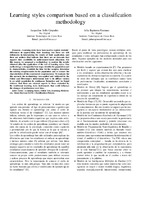Learning styles comparison based on a classification methodology

Fecha
2017Autor
Solís-Céspedes, Jacqueline
Espinoza-Guzmán, Julia
Metadatos
Mostrar el registro completo del ítemResumen
Learning styles have been used to explain students’
differences in approaching their learning, but there are still
deficiencies in interpreting the results of their application, and
there are authors that indicate that there are no elements that
support their credibility in achievement-based education. For
this reason, we proposed a methodology to analyze the results
obtained after the application of the test of learning styles. Our
methodology is designed in four steps: identify the population and
its characteristics, establish the time for the samples, determine
the existing conglomerates in the population and to extract the
characteristics of the constructed conglomerates. To evaluate the
this aproach, the methodology was applied and validated by the
Felder and Silverman’s dichotomous test vs its diffuse version
in an adult population in continuous formation and we found
evidence that there are external aspects to those evaluated by
the traditional learning styles instruments that could influence
the changes of preferences over time.
Descripción
© © 2017 IEEE. Personal use of this material is permitted. Permission from IEEE must be obtained for all other uses, in any current or future media, including reprinting/republishing this material for advertising or promotional purposes, creating new collective works, for resale or redistribution to servers or lists, or reuse of any copyrighted component of this work in other works.
Compartir
Métricas
Colecciones
- Artículos [29]

